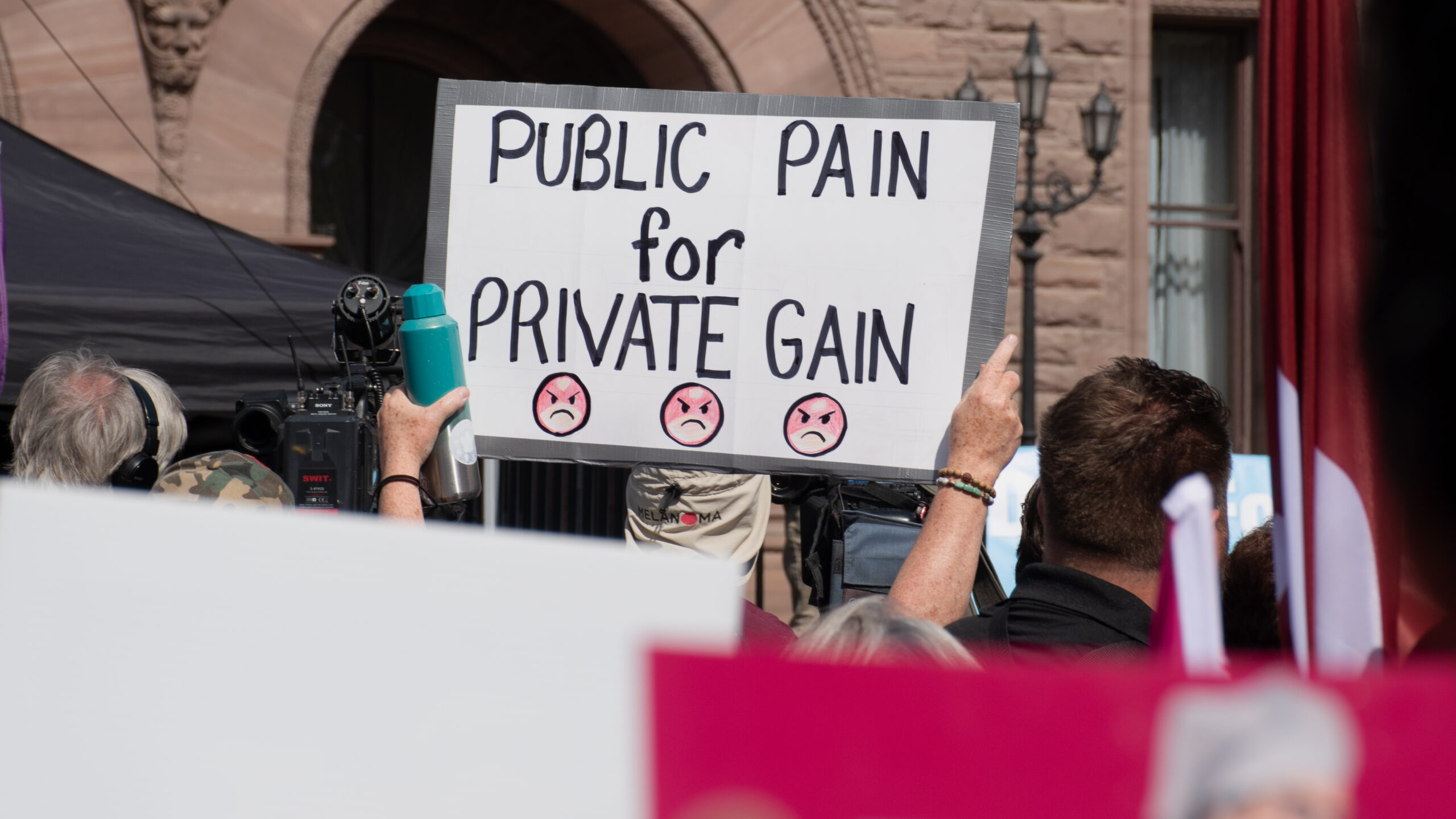Thousands of protesters occupied the lawn outside of Queen’s Park opposing the Ontario government’s plan to create and privatize parts of the province’s public healthcare system on Monday.
The Ford government passed Bill 60 in May, known as the Your Health Act, which allows for-profit clinics to conduct specific procedures covered by OHIP.
There is no information yet on how the province will regulate private clinics.
The new law comes after the pandemic nearly collapsed Ontario’s healthcare system which is now experiencing a widespread nursing shortage.
Critics say Ford’s decision will affect the most vulnerable populations and make healthcare less accessible.
Judith Norris, whose brother is part of the Ontario Disability Support Program (ODSP), said the Ford government’s actions will negatively affect people like her brother.
His care had already been affected by private healthcare when his vision began to decline, and they discovered he was suffering from cataracts.
After testing, Norris’ brother was recommended for surgery that cost $1,300, an impossibility for someone on ODSP who makes up to $1,308 a month, according to the Ontario government’s ODSP website.
“So, he can’t pay that. I can’t pay that,” Norris said.
After multiple attempts to upsell private care to her and her brother, Norris eventually elected to go on a year-long waitlist for the surgery.
“This happened in October of last year, and all of a sudden, the hospital opened up in November, and he had the surgery in November,” Norris said.
The province has increased funding to private healthcare.
The Ontario Health Coalition said the province boosted funding by $24 million to private ventures in July 2021. Private eye care providers can now use public facilities for surgeries as of January 2021.
Privatized medicine is far more costly than public healthcare, the coalition reports.
“It sounds conspiratorial,” said Natalie Marra, the executive director of the Ontario Health Coalition. “But the truth is they’ve increased the funding for private-for-profit clinics by literally hundreds of millions of dollars over the last two years.”
The Ford government estimated in January it would spend $18 million on existing private health clinics to deal with Ontario’s surgical backlog. Prime Minister Justin Trudeau said he was watching Ford’s decision closely to ensure the Canada Health Act was followed despite calling the move “innovative” in a separate interview with Toronto Star.
Chief Chris Moonias of the Neskantaga First Nation supported the protest because of the issues his People faced with healthcare.
“I come here today to lend my support in our struggles against this corrupt government using its legislative bulldozer against our rights,” he said. “Against our already weakened health care.
“What you feel here in Toronto or any other city, it’s probably worse, 100 times worse, in the Northern First Nations community,” Moonias said. “We don’t have doctors, we don’t have nurses, we don’t have a hospital.
“All we got is small little clinics that service us,” he said.
The decline in public health care has had a more severe impact on rural communities, and some townships have already started closing down hospitals.
Minden Hospital, in Haliburton County, and Chesley’s Hospital in Bruce County are two of many currently closed or facing ER closures.
Simcoe County Health Coalition’s co-chair, Anisa Carrascal, has noted that many rural citizens have shared concerns about how access to healthcare is becoming more and more complicated due to the closure of ERs.
“We had the chance to educate a lot of people in the community and talk with a lot of people about their concerns about what how the provision of health care in the province as it is right now,” Anisa said.
Healthcare professionals have extreme concerns about the cuts in funding that public hospitals are seeing.
Several hospitals across Ontario have already been impacted by these cuts, seen through staff shortages or cuts at Minden Hospital and Steven Memorial Hospital.
“We are seeing nurses leave the public system and go to work in these private systems,” said Erin Ariss, the provincial president of the Ontario Nurses’ Association.
“What they’re doing is siphoning off nurses and making the public system worse off,” Ariss said.
Carrascal said she is devastated by what is happening, especially in her 15 years of nursing. “The system has been collapsing for years and years. When I started my career, the nursing ratio was much, much smaller,” she said.
“It was one to four, right now it’s one to nine.”
Ariss said that this creates an alarming work environment for both nurses and patients. It results in the quality of care to decline and safety issues to arise.
Both Ariss and Carrascal believe the answers lie in improvements in the healthcare system.
“There are several ways to help us,” Carrascal said. “The very first thing that we really need to fix is the staffing issue, the fact that we have a serious issue with retention and recruitment of new nurses, and medical conditions and doctors. It goes all the way to the way we actually certified them.
The Financial Accountability Office estimates that Ontario will be short 33,000 nurses by 2028, and an investigation by the Toronto Star found 158 emergency room closures between 2022 and 2023.
“He (Ford) has billions of dollars that he has underspent in healthcare, so if he had just invested what he had budgeted, we would be better off,” Ariss said.

